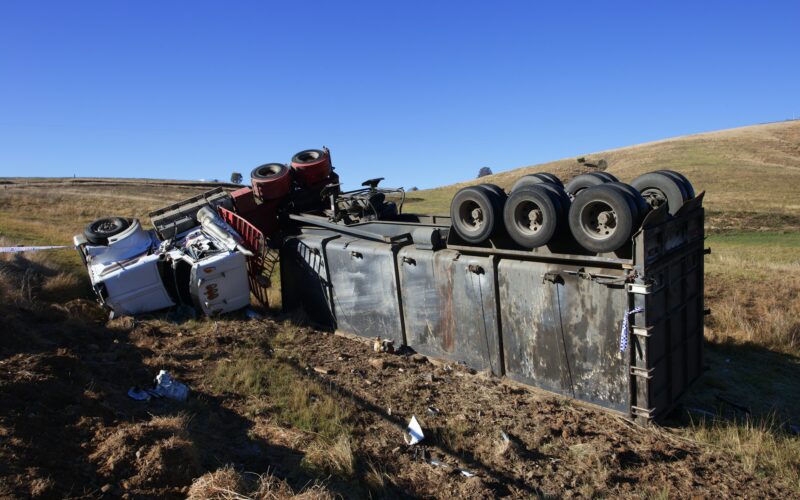Large commercial trucks typically weigh between 20 to 30 times more than regular passenger cars. As a result, truck accidents tend to be incredibly devastating.
But what if the truck driver’s insurance coverage tops out at a fraction of the true losses they caused? What can you do to recover just compensation? Here is what you should know about your legal options.
Check Your Own Auto Insurance Policy’s Underinsured Motorist Coverage
In the chaotic aftermath of any vehicle accident, your first phone call should be to your own car insurance provider. Specifically, you need to inquire about the details of your policy’s underinsured motorist coverage (known in the industry as UIM coverage).
This supplemental insurance provision kicks in if a liable party’s liability coverage taps out before fully compensating you for all truck accident-related damages. UIM allows you to file a claim through your own insurer seeking a payout of the difference, up to the limits specified in your policy documentation.
Let’s explore an example:
- The full value of your legitimate accident-related losses (medical bills, property damage, lost wages, etc) amounts to $4 million
- However, the truck driver who hit your vehicle only carried the minimum of $750,000 in liability insurance coverage
- Fortunately, your own auto insurance policy includes underinsured motorist protection with a maximum payout limit of $1 million
Given this scenario, you could file a UIM claim with your personal auto insurer seeking the $1 million payout cap. This would help partially bridge the gap between the true losses incurred and the woefully insufficient payout from the truck driver’s insurance.
In a perfect world, all conscientious vehicle owners would elect ample UIM policy limits to protect themselves in worst-case underinsured motorist situations. However, many folks don’t grasp the immense value of UIM until after they’ve already suffered severe harm at the hands of an underinsured driver. They only realize their mistake once catastrophic medical bills start piling up and lost wages jeopardize their household finances.
Sue Responsible Parties in Civil Court
Beyond UIM claims with your personal auto insurer, civil lawsuits represent possibly the most powerful mechanism for car accident victims to pursue full compensation for injuries sustained as a result of the negligent parties’ actions. Personal injury litigation taps into the USA’s open court system to hold dangerous drivers and complicit corporations financially accountable.
Now, you might ask yourself—how does suing help if the truck driver lacks adequate insurance or personal wealth to pay out big judgments? Great question.
Here’s the key insight driving effective truck accident litigation:
Commercial motor vehicles involve complex liability relationships between multiple parties beyond just the truck driver. Each entity owes a duty of care to operate safely and prevent foreseeable crashes and harm. Breaching these duties opens all involved parties to negligence claims.
In other words, there are numerous “deep pockets” truck accident attorneys can pursue through lawsuits, including:
- The trucking company itself employs the driver. As legal employers, trucking outfits can face vicarious liability for drivers’ negligence under respondeat superior legal principles.
- Truck leasing companies that rent vehicles to carriers and drivers. They may be sued for negligent entrustment or maintenance failures.
- Cargo brokers and shipping companies contract carriers to haul loads. They often bear liability for negligent hiring and retention of unsafe transport operators.
- Manufacturers of defective truck parts that potentially exacerbate wrecks, like faulty tires, brakes, or engines. Product liability law opens these companies up to legal action.
Vehicle manufacturing giants, freight shipping conglomerates, and billion-dollar equipment rental chains tend to boast far greater financial resources compared to undercapitalized mom-and-pop trucking operations. By naming such entities as defendants in personal injury litigation, victims’ attorneys vastly improve clients’ odds of securing complete financial restitution.
To fully utilize lawsuits for maximum truck accident compensation, finding an experienced personal injury law firm is a must. Let’s explore four common litigation targets these attorneys pursue.
Sue the Trucking Company
The trucking company (aka “motor carrier”) employing the individual driver would be the prime target in any truck collision legal action.
To keep overhead low, over 90% of U.S. trucking outfits are structured as limited liability companies (LLCs) or corporations. This shields owners’ assets from judgments if sued. It also encourages reckless cost-cutting that jeopardizes public safety.
However, experienced plaintiff’s attorneys leverage the legal discovery process to comb through carriers’ financial paperwork. The goal is locating collectible money sources trucks can tap to satisfy verdicts or pre-trial settlements. Targets include company bank accounts, real estate holdings, equipment assets that could be liquidated, and insurance policies beyond just basic liability coverage.
Often, seemingly judgment-proof operators will unlock additional insurance funds or even sell property to fund out-of-court legal settlements once staring down litigation. This avoids costly trials and paying plaintiff attorneys’ fees. So even brokers teetering on bankruptcy make attractive lawsuit targets in the quest to maximize case compensation.
Sue the Truck Driver Personally
In addition to the motor carrier, truck accident litigants almost always name the driver as an individual defendant in lawsuits.
By law, drivers share liability for accidents they cause, regardless of what company employs them at the time. So victories against drivers personally open them up to wage garnishments, bank account levies, and property liens until paying their share of judgments/settlements.
True, most drivers lack extensive assets or wealth on paper due to low industry pay. But determined attorneys still scour individuals’ finances for collectible sources like:
- Home/property equity
- Personal bank accounts
- Brokerage and retirement investment accounts
- Recreational vehicles – boats, ATVs, motorcycles, etc.
- Other valuable personal property that could be seized or force-liquidated
Naming drivers as lawsuit defendants also sets up future wage garnishments in states allowing this remedy. Going after future earnings provides a steady payment stream as insurers continue covering healthcare costs and missed wages pile up.
Sue Leasing Firms and Cargo Brokers
Lawsuits grow more creative when seeking additional liability from corporate entities adjacent to, but not directly involved with truck operations. Prime targets include equipment leasing outfits renting trucks to carriers and freight brokers/cargo owners contracting truckers to haul loads.
Truck leasing agencies often bear liability for enabling unsafe operations through negligent entrustment or lax maintenance. For instance, a leasing firm may face charges for renting commercial trucks to carriers with inadequate insurance policies in place. Or they could be sued for deficient truck inspection and repair regimens allowing unsafe brake conditions or worn tires.
Cargo brokers and shipping companies can also shoulder blame via negligent hiring and retention claims. For example, if a broker hired or retained a known reckless trucking outfit without conducting drug tests or verifying safe operating histories. Or they may sustain allegations around violating Federal mandates to vet carriers’ insurance coverage prior to tendering freight shipping contracts.
These peripheral transportation players tend to boast stronger balance sheets compared to thinly-capitalized motor carriers. So securing financial accountability for accident damages strengthens victims’ restitution prospects.
Product Liability Lawsuits Against Manufacturers
A final litigation avenue to explore: whether vehicle defects potentially contributed to your truck wreck. Some examples include a faulty tire blowout, defective brakes, or mechanical issues with the engine/transmission causing loss of control.
If inspection reveals equipment defects did play a role, you likely have grounds for a product liability lawsuit against the negligent manufacturer. Compared to cash-strapped carriers, major auto parts suppliers like brake makers, tire giants, and engine builders have very deep pockets. Their net worth can easily run into the billions.
Even winning a small percentage of liability against vehicle manufacturers significantly boosts the upper limits of potential accident compensation. Granted, the trucker still likely deserves the lion’s share of the blame for unsafe driving. However, flawed safety equipment exacerbating crash damages also warrants accountability.
Choosing the Right Truck Accident Attorney for Your Case
A lawsuit can help you access additional compensation when at-fault parties carry insufficient coverage. However, realizing litigation’s full financial benefits requires partnering with an experienced personal injury law firm up to the challenge.
When evaluating attorneys to advocate your injury claim, prioritize these 5 must-have credentials:
1. Nearby Office Location
Opting for a law firm in their local metro area or nearby region offers victims major advantages versus firms headquartered in states away. For example, Odessa truck accident victims are better off choosing law firms that are in Odessa, as opposed to ones located far away. But why exactly?
Well, local presence indicates deeper familiarity with county courts, judges, and regional settlement trends influencing case values. It also enables easier in-person meetings and court appearances without steep travel costs.
2. Specialized Focus on Truck Cases
Run right by legal generalists claiming to handle “any and all” personal injury case types. Car crashes differ enormously from commercial truck wrecks in scale, complexity, and liability nuances. Demand attorneys focused first and foremost on catastrophic truck and 18-wheeler incidents exclusively. Specialization proves mastery of niche litigation strategies.
3. Decades of Specific Experience
Mere specialization alone doesn’t cut it. Probe each firm’s tenure concentrating on truck injury cases measured in years or decades, not months. Veteran attorneys bring keen judgment forecasting case obstacles, smarter negotiation instincts, and credibility making insurers take significant settlement offers seriously.
4. Strong Case Result Pedigree
Vet all candidate firms’ track records achieving past verdicts or settlements specifically for truck accident clients. Review published case citations and payout amounts as proof. Blockbuster jury verdicts and 8-figure pre-trial truck accident settlements showcase a firm’s litigation prowess and connections with court officials, claims adjusters, and defense litigators. Outsized case results drive maximum settlements in your case as well.
5. Lawsuit Financing Options
The best attorneys level the playing field against insurers by offering lawsuit financing. That is, cash advances while cases proceed to cover urgent living costs without forcing hurried settlements for pennies on the dollar. Top firms make financing available at little-to-no upfront cost to clients. Repayment waits until your case outcome when amounts owed are deducted from the final verdict or settlement.
Final Thoughts
There are two potential avenues for securing additional compensation if a truck driver’s insurance falls short:
- Claiming your own UIM coverage
- Civil lawsuits targeting multiple liable defendants beyond just the truck driver.
And since medical bills, lost income, and pain/suffering amounts can easily get out of control, you should never shy away from working tirelessly to track down every possible payer to help you move forward. Don’t leave money on the table or let negligent parties off easy.



